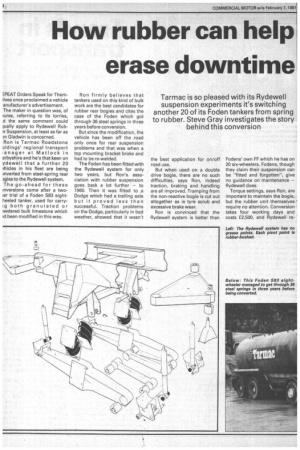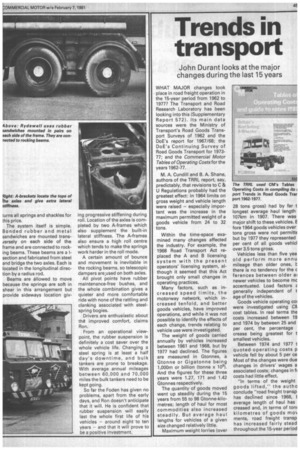How rubber can help erase downtime
Page 46

Page 47

If you've noticed an error in this article please click here to report it so we can fix it.
Tarmac is so pleased with its Rydewell suspension experiments it's switching another 20 of its Foden tankers from spring to rubber. Steve Gray investigates the story behind this conversion
F.PEAT Orders Speak for ThemIves once proclaimed a vehicle anufacturer's advertisement. The maker in question was, of mrse, referring to its lorries, it the same comment could wally apply to Rydewell Rub)r Suspension, at least as far as )nGladwin is concerned.
Ron is Tarmac Roadstone oldings' regional transport anager at Matlock in erbyshire and he's that keen on ydewell that a further 20 thicles in his fleet are being )nverted from steel-spring rear )gies to the Rydewell system. The go-ahead for these Inversions come after a two!ar trial of a Foden S83 eightheeled tanker, used for carryig both granulated or )wdered bulk limestone which id been modified in this way. Ron firmly believes that tankers used on this kind of bulk work are the best candidates for rubber rear bogies and cites the case of the Foden which got through 36 steel springs in three years before conversion.
But since the modification, the vehicle has been off the road only once for rear suspension problems and that was when a top mounting bracket broke and had to be re-welded.
The Foden has been fitted with the Rydewell system for only two years, but Ron's association with rubber suspension goes back a lot further — to 1960. Then it was fitted to .a Dodge which had a trailing axle but it proved less than successful. Traction problems on the Dodge, particularly in bad weather, showed that it wasn't the best application for on/off road use.
But when used on a double drive bogie, there are no such difficulties, says Ron, indeed traction, braking and handling are all improved. Tramping from the non-reactive bogie is cut out altogether as is tyre scrub and excessive brake wear.
Ron is convinced that the Rydewell system is better than Fodens' own FF which he has on 20 six-wheelers. Fodens, though they claim their suspension can be "fitted and forgotten", give no guidance on maintenance — Rydewell does.
Torque settings, says Ron, are important to maintain the bogie, but the rubber unit themselves require no attention. Conversion takes four working days and costs £2,500, and Rydewell re :urns all springs and shackles for chis price.
The system itself is simple. Bonded rubber and metal sandwiches are mounted transversely on each side of the frame and are connected to rocking beams. These beams are a lsection and fabricated from steel and bridge the two axles. Each is located in the longitudinal direction by a radius rod.
Beams are allowed to move because the springs are soft in shear in this arrangement but provide sideways location giv
ing progressive stiffening during roll. Location of the axles is completed by two A-frames which also supplement the built-in lateral stiffness. The A-frames also ensure a high roll centre which tends to make the springs work harder in the roll mode.
A certain amount of bounce and movement is inevitable in the rocking beams, so telescopic dampers are used on both axles.
All pivot points have rubber maintenance-free bushes, and the whole combination gives a quieter and more comfortable ride with none of the rattling and clanking associated with steelspring bogies.
Drivers are enthusiastic about the improved comfort, claims Ron.
From an operational viewpoint, the rubber suspension is definitely a cost saver over the whole vehicle life. Changing a steel spring is at least a half day's downtime, and bulk tankers are prone to breakage. With average annual mileages between 60,000 and 70,000 miles the bulk tankers need to be kept going.
So far the Foden has given no problems, apart from the early days, and Ron doesn't anticipate that it will. He is confident that rubber suspension will easily last the whole first life of his vehicles around eight to ten years — and that it will prove to be a positive investment.












































































































